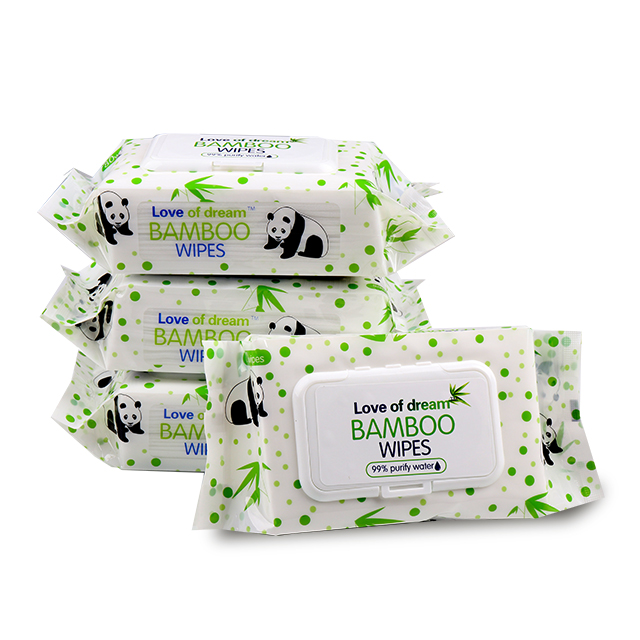Organic baby wet wipes are typically made with natural and eco-friendly materials to minimize the use of synthetic or potentially harmful substances. Common materials used in making organic baby wet wipes include:
- Organic Cotton: Cotton sourced from organic farming practices without the use of synthetic pesticides or fertilizers is a common material for the wipes’ fabric.
- Bamboo Fibers: Bamboo is a sustainable and eco-friendly material known for its softness and absorbency. Bamboo fibers are often used in organic wipes due to their natural antibacterial properties.
- Plant-Based Fibers: Other plant-based fibers such as eucalyptus, wood pulp, or viscose derived from sustainably managed forests might be used as an eco-friendly alternative to conventional synthetic materials.
- Natural Extracts: Organic wet wipes might incorporate natural extracts like aloe vera, chamomile, or calendula known for their soothing and gentle properties on baby skin.
- Biodegradable Materials: Materials chosen for organic baby wipes are often biodegradable, breaking down more easily in landfills compared to conventional synthetic wipes.
- Eco-Certified Ingredients: The ingredients used in organic baby wipes are often certified by recognized eco-certification bodies, ensuring they meet specific environmental and safety standards.
- Chemical-Free: Organic baby wipes strive to avoid harsh chemicals, fragrances, parabens, phthalates, alcohol, and other potentially irritating or harmful substances commonly found in conventional wipes.
These materials are chosen to create a more natural, gentle, and eco-friendly option for baby wipes, organic baby wet wipes catering to parents seeking safer and more environmentally conscious alternatives for their children’s skincare routines.
Can you discuss the range of mobility organic baby wet wipes provide for wearers?
Organic baby wet wipes are primarily designed for cleaning and maintaining hygiene, offering convenience and comfort for wearers. Their range of mobility is somewhat limited compared to other diapering options like traditional diapers or pull-up pants since they are primarily intended for cleaning rather than providing long-term absorbency or containment.
However, here are some aspects related to mobility and convenience when using organic baby wet wipes:
- On-the-Go Cleaning: Organic wet wipes offer convenience for quick cleanups, allowing caregivers to easily clean the baby’s bottom, hands, face, or other body parts while on the move.
- Ease of Use: They are lightweight and compact, making them easy to carry in a diaper bag, purse, or pocket, enhancing mobility when traveling or running errands.
- Versatility: Organic baby wet wipes can be used for various purposes beyond diaper changes, such as wiping surfaces, toys, or even for personal use by adults.
- Quick Accessibility: They provide immediate access for caregivers, ensuring prompt cleaning without needing to find water or additional cleaning supplies.
- Limited Absorbency: Unlike traditional diapers or pull-up pants, wet wipes do not offer long-term absorbency or containment. They are not intended to substitute for diapers but rather complement them by providing cleaning and hygiene support.
While organic baby wet wipes offer mobility and convenience in maintaining cleanliness and hygiene, their primary function is limited to cleaning rather than providing extensive mobility support. For extended periods or specific activities requiring more containment and absorbency, caregivers typically opt for diapers or pull-up pants designed for that purpose.
